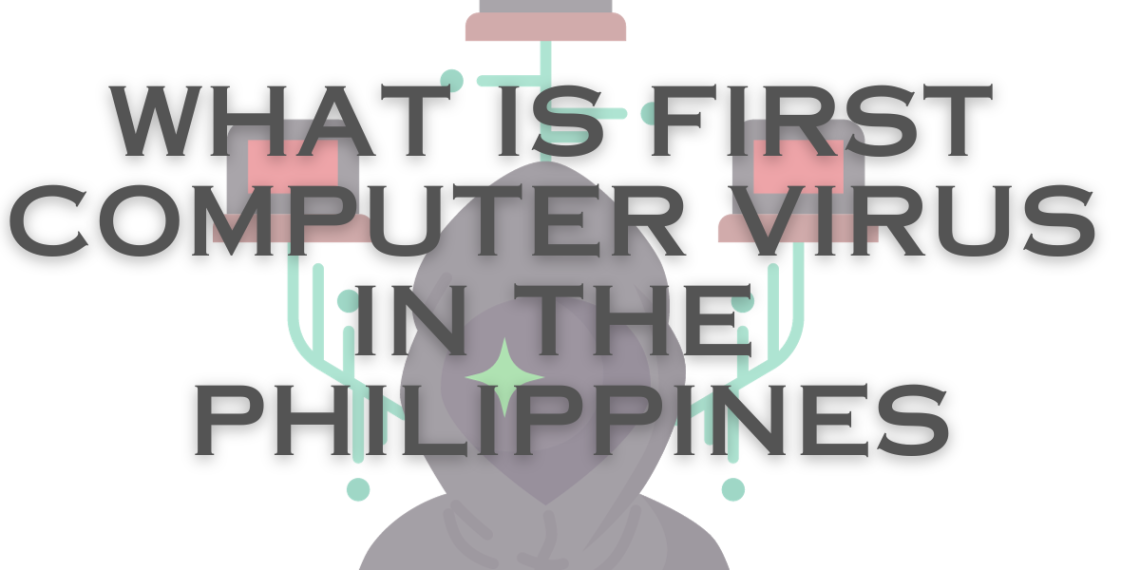What is the First Computer Virus in the Philippines?
What is the First Computer Virus in the Philippines? For this question let’s find out the answers in this blog
On May 4, 2000, the ILOVEYOU virus (also known as Love Bug or Letter Worm) made headlines worldwide as one of the farthest-reaching viruses ever. It caused $10 billion worth of damages across computer networks worldwide.
Onel de Guzman managed to avoid criminal prosecution due to a lack of laws targeting malware creators at that time, yet ILOVEYOU served as an eye-opener to cybersecurity vulnerabilities worldwide.

What is the ILOVEYOU Virus?
The ILOVEYOU virus, colloquially known as the “love bug,” emerged in May 2000, rapidly infecting millions of computers worldwide through deceptive emails. Exploiting technical vulnerabilities and human behavior, it enticed recipients with seemingly familiar origins, spreading via address books and causing widespread disruption. Companies responded by shutting down networks, inadvertently exacerbating business disruptions.
This incident underscored the vulnerability of computer systems to social engineering attacks, prompting governments and corporations to prioritize cybersecurity measures. Regrettably, the virus’s creator, Onel de Guzman, faced no legal consequences in the Philippines at the time.
In a 2020 interview, de Guzman expressed remorse, revealing his initial intent to collect passwords locally. Despite the short-lived reign of terror, the ILOVEYOU virus catalyzed global efforts to combat cybercrime.
Founder of First Computer Virus in the Philippines

- Onel de Guzman, a Filipino programmer, created the infamous ILOVEYOU virus, which first surfaced on the Internet in May 2000.
- The virus quickly spread worldwide, infecting millions of computers, including a significant number in America, marking the world’s first major computer virus outbreak.
- The intention of Creation: According to de Guzman, his primary motive behind creating the worm was to steal internet passwords, enabling him to access the internet without incurring usage charges.
- After releasing the virus, de Guzman moved his computer equipment home, subsequently hiding or relocating. However, law enforcement tracked his location through diskettes left behind during the virus release.
- Following the incident, de Guzman relocated to Manila and found employment at a mobile phone repair booth, leading a relatively quiet life.
- In an interview with investigative journalist Geoff White, de Guzman openly admitted to creating and releasing the worm, exonerating two initially suspected classmates.
ILOVEYOU Methods of Infection
- Email Propagation: Spread through email attachments, particularly affecting Outlook users, with subject lines like “ILOVEYOU.”
- Destructive Capabilities: ILOVEYOU could delete or corrupt various file types, modify Windows Registry files, and spread through Internet Relay Chat.
- Financial Impact: Cybersecurity experts estimated the virus’s damage at $5 to $10 billion, causing business closures and data loss.
Difference Between Virus and Worm
Virus Characteristics
- A virus needs host files for activation and spread, requiring user interaction to execute.
- Viruses typically spread through host files and necessitate user actions like opening infected attachments.
- It is attached to executable files, dependent on host programs for activation.
- Viruses may cause isolated infections and disruptions.
- Depends on user actions, such as opening infected email attachments.
Viruses tend to affect individual files or specific programs.
Worm Characteristics
- It is independent and self-replicating without user intervention, exploiting vulnerabilities for infiltration.
- Worms autonomously replicate across systems, spreading without human intervention, often through network vulnerabilities.
- It functions independently, capable of self-replication across networks and devices.
- Worms can lead to major outbreaks, exemplified by the ILOVEYOU worm, causing widespread network disruptions globally.
- It vulnerabilities or uses social engineering, rapidly spreading across systems without user interaction.
- Worms can have a broader impact, compromising entire networks and systems due to their autonomous and rapid replication.
What Is a Worm?
A worm is a self-replicating malicious software program that independently spreads across computer systems, exploiting vulnerabilities without user intervention. Unlike viruses, worms do not rely on host files and pose significant network security risks by infiltrating devices and networks, often causing major disruptions on a global scale.
How does ILOVEYOU “First Computer Virus in the Philippines” Spread?
The ILOVEYOU virus operated through deceptive email attachments posing as harmless text files. Upon recipient interaction, the attachment surreptitiously downloaded, initiating a cascade of destructive actions. It overwrote crucial files with malware copies, indiscriminately targeting pictures, videos, and music files. Employing stealth, it sought new targets within the victim’s address book, perpetuating the cycle of infiltration.
Propagation and Spread Mechanism
- Disguised as text files, the virus utilized email attachments to gain entry into unsuspecting users’ systems.
- Upon user interaction, the virus is downloaded covertly, avoiding detection and immediate awareness.
- ILOVEYOU systematically overwrites files, spreading its malicious code to every contact within the victim’s address book.
- Targeting diverse file types, including pictures and videos, the virus created widespread chaos and disruption.
Worm Characteristics and Global Impact
- Unlike viruses relying on human interaction, ILOVEYOU operated as a worm, autonomously replicating across computers without user intervention.
- Capitalizing on a flaw in Microsoft Visual Basic Scripting (VBS), the virus became one of the first to exploit this vulnerability.
- Beyond causing technical damage, ILOVEYOU instilled fear and confusion among users, marking a paradigm shift in cybersecurity awareness.

Cybersecurity Lessons
- The virus triggered a significant cyber attack, prompting organizations like Ford Motor Company and AT&T to temporarily halt services.
- ILOVEYOU underscored the importance of staying current on software updates, installing firewalls, and remaining informed about cybersecurity best practices.
- While cybersecurity awareness has increased, the aftermath of ILOVEYOU emphasizes the enduring importance of regular antivirus updates to thwart evolving threats.
The Other Name of ILOVEYOU Computer Virus
- ILOVEYOU is also recognized by alternative names such as “Love Bug,” “Love Letter for You,” or simply the “Love Bug Virus.”
- These alternative names gained prominence as the virus swiftly spread worldwide in May 2000, infecting millions of computers.
- The virus often disguised itself with the subject line “ILOVEYOU,” contributing to its rapid transmission through email attachments.
- The Love Bug Virus, under its various names, marked a pivotal moment in the history of cybersecurity, challenging traditional notions of digital safety.
- Copycat viruses emerged with similar deceptive tactics, utilizing subject lines like “JOKE” and “Mother’s Day!” to exploit user trust.
- In response to the Love Bug and its variants, organizations worldwide adopted heightened cybersecurity measures, emphasizing the need for robust antivirus solutions and proactive security protocols.
- The Love Bug’s legacy endures as a cautionary tale, influencing ongoing efforts to educate individuals and businesses about the risks posed by deceptive email attachments and the importance of staying vigilant in the face of evolving cyber threats.
- The Love Bug’s alternative names serve as symbols of a significant chapter in the evolution of cyber threats, prompting continual advancements in cybersecurity practices to safeguard digital landscapes globally.
Impact of the First Computer Virus in the Philippines
The ILOVEYOU virus, unleashed on May 4, 2000, left an indelible mark on global cybersecurity. By exploiting technical vulnerabilities and manipulating human behavior, it swiftly infected millions of computers, causing extensive damage and significant financial losses for numerous companies.
This widespread impact prompted governments worldwide to confront cybersecurity concerns head-on, signifying a pivotal moment in acknowledging the threat posed by malicious software attacks.
The arrests of Reonel Ramones and Onel de Guzman, key figures linked to the virus, underscored the legal gaps of the time. Released due to the absence of anti-malware laws, their cases highlighted the urgent need for comprehensive legislation.
How ILOVEYOU Claimed the What is the First Computer Virus in the Philippines?
- ILOVEYOU virus, or “love bug,” emerged in May 2000, spreading rapidly through deceptive emails.
- Exploited both technical vulnerabilities and human behavior, infecting computers globally.
- Prompted widespread business disruptions as companies shut down networks to contain the infection.
- Highlighted the vulnerability of computer systems to social engineering attacks.
- Precipitated global efforts by governments and corporations to enhance cybersecurity measures.
- Onel de Guzman, the virus creator, faced no legal consequences in the Philippines at the time.
- In a 2020 interview, de Guzman expressed regret, revealing his initial intent to collect passwords locally.
What Are The Ways To Fix Iloveyou?

- Security companies promptly released updates for antivirus software to prevent further ILOVEYOU infections, enhancing overall protection.
- Updates were implemented for email clients to address vulnerabilities exploited by the virus, reducing the risk of infiltration through email servers.
- Enhanced security measures were introduced to address the exploit in the Microsoft Windows system and VBS scripting language, fortifying defenses against similar threats.
- Heightened awareness campaigns and user education emphasised cautious downloading and handling of email attachments to minimize the virus’s spread.
- Major institutions, including the U.S. Senate and the British House of Commons, temporarily closed down email systems to contain the infection, preventing further damage.
How to Stay Safe From the ILOVEYOU Computer Virus
Familiarize yourself with the ILOVEYOU virus, also known as Love Letter for You or Love Bug, which infiltrated millions of Windows PCs through malicious email attachments, causing widespread disruptions.
Security Measures for Individuals
Exercise caution when opening attachments, especially from unknown senders, to prevent unintentional activation of the virus.
Ensure your computer is equipped with updated antivirus software, including anti-ransomware protection, to detect and eliminate potential threats.
Implement regular backup procedures to safeguard essential files, minimizing the impact of potential data loss in case of an infection.
Organisational Preparedness
Companies should maintain robust cybersecurity infrastructure, including firewalls and VPN capabilities, to fortify defenses against email-borne viruses like ILOVEYOU.
Conduct cybersecurity awareness training for employees, emphasizing the importance of avoiding suspicious email attachments and recognizing potential threats.
Response Strategies
In the event of an email attachment suspected to be ILOVEYOU, refrain from opening it and report it to IT support promptly.
Leverage comprehensive antivirus solutions, such as McAfee, that offer multi-layered defense mechanisms, including firewall capabilities.
Basic Setup
Even though ILOVEYOU struck over two decades ago, remain vigilant against evolving threats, as cybercriminal tactics continue to advance.
Implement best practices, such as regular system updates and safe browsing habits, to fortify your digital defenses against modern malware.
Top 4 Antiviruses
- McAfee Antivirus – https://www.mcafee.com/
- Norton Antivirus – https://www.norton.com/
- Kaspersky Antivirus – https://www.kaspersky.com/
- Bitdefender Total Security- https://www.bitdefender.com/
Conclusion
The ILOVEYOU virus, a watershed moment in cybersecurity, highlighted vulnerabilities in both technology and human behavior. Despite global impact and arrests, legal gaps underscored the need for comprehensive legislation. It spurred cybersecurity awareness and legislative actions worldwide, shaping the modern cyber landscape.
Frequently Asked Questions
1. What is ILOVEYOU’s impact on cybersecurity?
ILOVEYOU exposed vulnerabilities, prompting global cybersecurity awareness and legislative measures.
2. Who created the ILOVEYOU virus?
Onel de Guzman, a Filipino programmer, created the infamous ILOVEYOU virus.
3. Why was the creator not prosecuted?
Legal gaps in the Philippines at the time prevented the prosecution of Onel de Guzman.
4. How did ILOVEYOU spread?
ILOVEYOU spreads through deceptive email attachments, exploiting both technical and human vulnerabilities.
5. What is the First Computer Virus in the Philippines?
The ILOVEYOU virus, emerging in 2000, holds the distinction of being the first major computer virus in the Philippines.







